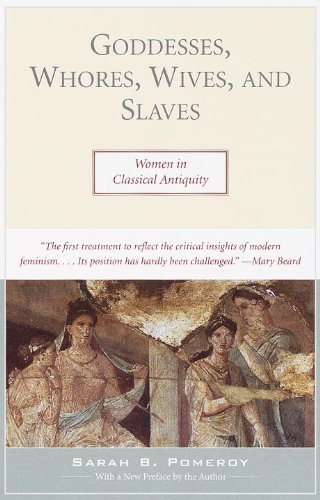Goddesses, Whores, Wives, and Slaves
Women in Classical Antiquity
Sarah Pomeroy
BOOK REVIEW

In the tempestuous world of Classical Antiquity, women were often relegated to the shadows of history-categorized as goddesses, wives, whores, and slaves. Goddesses, Whores, Wives, and Slaves: Women in Classical Antiquity by Sarah Pomeroy rips the veil off these archetypes, presenting a vivid tapestry of female experiences that are as profound as they are overlooked. Through her meticulous research, Pomeroy illuminates the voices of women who navigated this male-dominated landscape, forcing us to confront the realities of their desires, struggles, and triumphs.
This work isn't merely a scholarly triumph; it's a clarion call to rethink the narratives that have shaped our understanding of the past. With each turn of the page, the reader is drawn into a whirlwind of emotions-compassion, outrage, and enlightenment. In the crowded marketplace of Classical history texts, Pomeroy's analysis stands apart, laced with an honest urgency that speaks to contemporary issues of gender and society.
Do you feel the weight of those chains that bound women to their roles? Pomeroy paints them with nuanced strokes, exploring how these women, often seen merely as relics of myth or anecdote, were agents of their own stories. Most notably, Pomeroy's examination of figures like the goddess Artemis or the infamous courtesan Aspasia shatters our traditional understandings and compels the reader to acknowledge the complexity of their existences. These women weren't just footnotes; they were pivotal characters in the unfolding drama of history.
The reactions to Pomeroy's work have been as colorful as the tales she recounts. Many readers laud her for unveiling the often hidden narratives that speak volumes about societal constructs and the power dynamics at play. Critics, however, argue that she occasionally romanticizes these figures, presenting an anachronistic view that may distort their realities. Are we witnessing a reclamation of history or a rewriting of its most intricate details? This ongoing debate only enriches the conversation around Pomeroy's scholarship.
Delving deeper into Pomeroy's scholarship reveals her profound dedication to amplifying these women's stories. Drawing on a wealth of historical texts, archaeological findings, and cultural artifacts, she constructs a magnificent mosaic that challenges us to reconsider what it means to be a woman in a world that has historically silenced them. What do these narratives tell us about our own lives today? The echoes of their struggles resonate through the ages, inviting us to reflect on the ongoing battle for gender equality and the recognition of women's agency.
In Goddesses, Whores, Wives, and Slaves, Pomeroy does not merely educate-she ignites. Her writing transcends the academic so often synonymous with history, beckoning readers from all walks of life to engage with the past viscerally. In the face of overwhelming odds, these women rose, carved out space for themselves, and, in doing so, created legacies that continue to inspire movements across cultures.
A longing for understanding hangs heavy in the air. Will you allow this book to haunt your thoughts and alter the pathways of your perspective? Pomeroy's work is a poignant reminder of the resilience of women through the ages, and perhaps now more than ever, we need to embrace those narratives that celebrate strength, cunning, and indomitable spirit.
As you consider diving into this treasure trove of historical insights, prepare yourself for an emotional voyage that might just upend your understanding of both ancient and modern femininity. What awaits you in Pomeroy's meticulous research is a revelation that promises to echo through the annals of your mind long after you've turned the last page. 🌊💫
📖 Goddesses, Whores, Wives, and Slaves: Women in Classical Antiquity
✍ by Sarah Pomeroy
🧾 428 pages
2011
#goddesses #whores #wives #slaves #women #classical #antiquity #sarah #pomeroy #SarahPomeroy